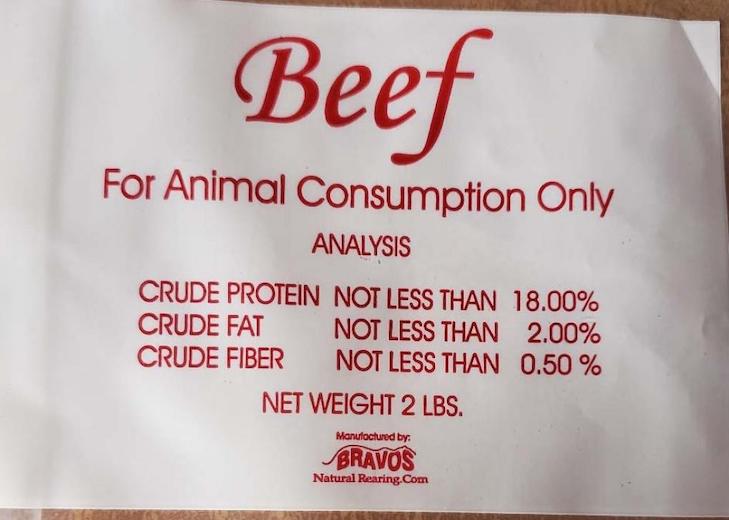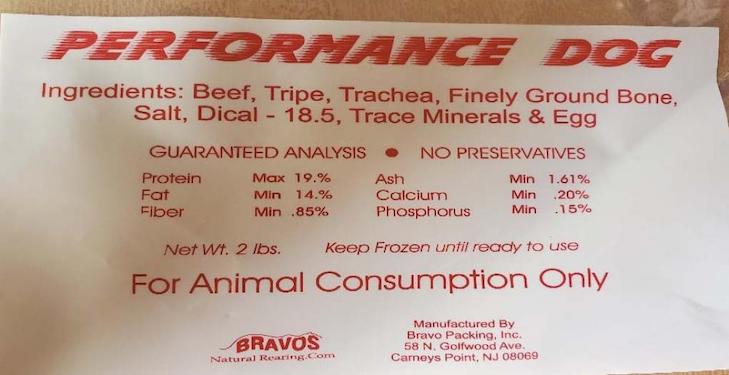The year began with a recall of Sportmix pet food due to fatal aflatoxin levels. Now, another dog food is on recall.
Bravo Packing, Inc. previously announced a voluntary recall of two pet food products. As of March 17, that recall has been expanded to include all pet foods and bones in all sizes.
An FDA inspection found that collected samples tested positive for Salmonella and Listeria monocytogenes. As a result, the food was determined a potential health risk to both pets and humans.
So far, no human or animal illnesses have been reported.
Recalled Products:
|
Pet Food Product Names |
Size |
|---|---|
| “Performance Dog” (chub) frozen raw dog food | 2 lbs. |
| “Performance Dog” (chub) frozen raw dog food | 5 lbs. |
| “Green Tripe” (chub – ground bovine stomach) frozen raw dog food | 2 lbs. |
| “Green Tripe” (chub – ground bovine stomach) frozen raw dog food | 5 lbs. |
| “Beef” (chub – ground) frozen raw dog food | 2 lbs. |
| “Beef” (chub – ground)frozen raw dog food | 5 lbs. |
| “Performance Dog” (patties) frozen raw dog food | unknown |
| “Tripe” (patties ¼ lbs.) frozen raw dog food | unknown |
| Bones (smoked) 14 varieties | unknown |
What To Do if Your Dog’s Food Is Recalled?
If your dog’s food has been recalled, stop feeding the food immediately. The food should be returned to the store where it was purchased, and you may be able to obtain a refund. Or, you may properly dispose of the food in a manner that prevents other animals from gaining access to it.
If your dog has already been eating the recalled food, consult with your veterinarian to determine what actions, if any, you should take. Even if your dog is not showing any signs of illness, it’s best to consult with your veterinarian as quickly as possible. Depending upon the reason the food was recalled, your veterinarian will be able to determine what, if any, action should be taken.
If you believe your dog has become ill or has died because of eating a recalled food product, you should file a complaint with the FDA. You can file a report online or contact the FDA consumer complaint coordinator in your state.
If you can no longer feed your dog his usual diet due to a recall, try to find a similar food to replace it or ask your veterinarian for suggestions. Keep in mind that sudden changes in diet can lead to dietary distress for dogs.
Consumers with questions should contact Bravo Packing, Inc. at 856-299-1044 (Monday – Friday, 9:00 AM-2:00 PM, EST).


What are the Symptoms of Salmonella Infection?
Salmonella is a bacteria that sickens both humans and animals. The CDC says that people infected with Salmonella can develop abdominal cramps, diarrhea, nausea, vomiting, chills, bloody stool, headache, and fever. Onset after exposure is anywhere from eight to 72 hours, and recovery can take a few days.
While the severity varies according to the strain of Salmonella and the general health of the patient, the elderly, the infantile, and the immune-suppressed are highly susceptible. In them, a Salmonella infection (called salmonellosis) can lead to hospitalization and even death.
Contrary to myth, dogs and other animals also develop salmonellosis. The signs of Salmonella in dogs include
- vomiting
- bloody stool or diarrhea
- lethargy
- loss of appetite
- fever
What to Do if Your Dog Has Salmonellosis
Dogs who develop salmonellosis symptoms should see a veterinarian. In some cases, infected canines may not actually show signs of being sick, but they can still shed the bacteria in their feces and their saliva. Dog owners should always clean up after their pets and scrub their hands after walking them regardless of what kinds of treats and foods they are feeding them.
What to Do If You Have Salmonellosis
If you think you have contracted salmonellosis, see your health care provider for confirmation and treatment. If you believe your dog is displaying symptoms, take them to the vet.
What is Listeriosis?
Listeriosis is a serious infection usually caused by eating food contaminated with Listeria monocytogenes. An estimated 1,600 people get listeriosis each year, and about 260 die, according to the Center for Disease Control and Prevention. Those most at risk include pregnant women, newborns, adults aged 65 or older, and people with weakened immune systems. Although L. monocytogenes can infect many animal species, dogs and cats rarely get listeriosis and don’t usually show signs of the disease.
Report Your Concerns
If you have a concern about salmonellosis or exposure to Salmonella through a product, you can report it to the FDA through the Safety Reporting Portal. This helps the agency keep track of issues and trace cases back to their origins. The FDA encourages you to report complaints through the Safety Reporting Portal or by calling your state’s FDA Consumer Complaint Coordinators. Your veterinarian may also use the Vet-LIRN Network to test pets from a household with a person infected with Salmonella.
Tips to Keep Your Dog’s Food Safe
- Clean your dog’s food and water bowls daily with dish soap and hot water
- Use stainless steel bowls
- Keep opened canned food covered and refrigerated
- Keep dry food in an enclosed container to prevent exposure to rodents and pests
- Wash your hands with soap and water before, and especially after, handling pet food
- Feed your pet a healthy diet, as recommended by your veterinarian

